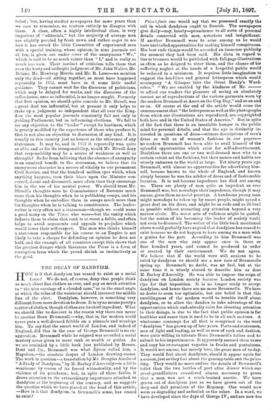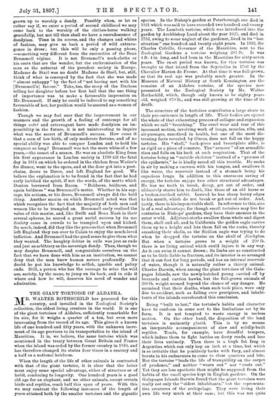THE DECAY OF DANDYISM.
HOW is it that dandyism has ceased to exist as a social force ? We do not, of course, deny that people think as much about fine clothes as ever, and pay as much attention to " the nice carriage of a clouded cane," or to the exact angle at which the sides of the waistcoat should intersect the middle line of the shirt. Dandyism, however, is something very different from mere devotion to dress. It is by no means purely a matter of clothes, though clothes are its chief ingredient. What we should like to discover is the reason why there can never be another Beau Brummell,—why, that is, the modern world never puts a well-dressed fribble on a pinnacle and worships him. To say that the smart world of London, and indeed of England, did this in the case of George Brummell is no ex- aggeration. Brummell while he reigned was accorded a social mastery never given to mere rank or wealth or genius. As we are reminded by a little book just published by Messrs. Dent and Co., Brummell was what Byron called him, a Napoleon,—the absolute despot of London drawing-rooms. The work in question—a translation by Mr. Douglas Ainslie of "A Study of Dandyism," by M. Barbey d'Aurevilly—is a little wearisome by reason of its forced whimsicality, and by the violence of its paradoxes ; but, in spite of these faults, it draws attention to the extraordinary importance attached to dandyism at the beginning of the century, and so suggests the question which we have placed at the head of this article, —How is it that dandyism, in Brummell's sense, has ceased to exist? Primcilacie one would say that we possessed exactly the soil in which dandyism ought to flourish. The newspapers give daily—nay, hourly—prominence to all sorts of personal details connected with men, notorious and insignificant. If another Brummell were to arise among us he would have unrivalled opportunities for making himself conspicuous. His best rude things would be accorded an immense publicity the moment they had been said. His dicta in regard to ties or trousers would be published with full-page illustrations as often as he deigned to utter them, and the chance of his suffering neglect at the hands of a forgetful public would be reduced to a minimum. It requires little imagination to suggest the headlines and general letterpress which would accompany "A Glimpse into the Great Dandy's Ward- robes." "We are enabled by the kindness of Mr. — to afford our readers the pleasure of seeing an absolutely correct set of reproductions of the various garments worn by the modern Brummell at Ascot on the Cup Day," and so on and so on. Of course at the end of the article would come the announcement that "the letterpress as well as the photographs from which our illustrations are reproduced, are copyrighted both here and in the United States of America." But in spite of the fact that there is an insatiable hunger in the public mind for personal details, and that the age is distinctly in- terested in questions of dress—witness descriptions of men's dress as well as of women's fashions in our papers— no modern Brummell has been able to avail himself of the splendid opportunities which exist for self-advertisement. Doubtless there are one or two well-dressed men who to a certain extent set the fashions, but their names and habits are utterly unknown to the world at large. Yet ninety years ago Brummell, with almost no opportunities for advertising him- self, became known to the whole of England, and known simply because he was the arbiter of dress and of fashionable luxuries. It is not because impudence has died out among us. There are plenty of men quite as impudent as ever Brummell was, but nowadays their impudence, though it may amuse, gives them no social prestige. A handsome young man might nowadays be taken up by smart people, might spend a great deal on his dress, and might be as rude and as ill-bred as possible without attracting any attention beyond a very narrow circle. His worst acts of rudeness might be quoted, but the notion of his becoming the leader of society would not even be discussed. The writer of the little book mentioned above would probably have argued that dandyism has ceased to exist because we do not happen to have among us a man with a genius for the part. According to him Brummell was one of the men who only appear once in three or four hundred years, and cannot be produced to order or created by their environment. We do not agree. We believe that if the world were still anxious to be ruled by dandyism we should see a new race of Brummells spring up. Brummell, no doubt, was no fool, but at the same time it is utterly absurd to describe him as does M. Barbey d'Aurevilly. He was able to impose the reign of dandyism on London society because London society was ripe for that imposition. It is no longer ready to accept dandyism, and hence there are no more Brummells. We have no desire to seem too optimistic, but our belief is that this unwillingness of the modern world to trouble itself about dandyism, or to allow the dandies to take advantage of the opportunities which undoubtedly exist for directing attention to their doings, is due to the fact that public opinion is far healthier and saner than it used to be in all such matters. A wholesome contempt for all that is comprised in the word " dandyism " has grown up of late years. Poets and statesmen, men of light and leading, as well as men of rank and fashion, were quite willing to tolerate Beau Brummell's follies and to submit to his impertinences. It apparently amused them to see and copy his extravagant vagaries in frocks and pantaloons. It would not amuse, but merely bore, the great men of to-day. They would feel about dandyism, should it appear again for a season, just as they feel about the gaming-table and the prize- ring. They would no more endure the details of Ben m mell's toilet than the two bottles of port after dinner which our great-grandfathers considered almost necessary to prove that a man was not a crack-brained ascetic. We have grown out of dandyism just as we have grown out of the deep and dull potations of the Regency. One would now seem as degrading and as foolish as the other. In a word, we have developed since the days of George IV., and are now too
grown up to worship a dandy. Possibly when, or let us rather say if, we enter a period of second childhood we may come back to the worship of the clothes-horse walking gracef ully, but not till then shall we have a recrudescence of dandyism. Time in its course, and the changes and whims of fashion, may give us back a period of wild extrava- gance in dress ; but this will be only a passing phase, —something very different from the enormities of the Beau Brummell regime. It is not Brummell's neck-cloths or his coats that are the wonder, but the enthronisation of the man as the autocrat of the proudest society in Europe. Madame de Steel was no doubt Madame de Stag, but, still, think of what is conveyed by the fact that she was made "almost unhappy" by the fact of "not having met with his [Brummell's] favour." Take, too, the story of the Duchess telling her daughter before her first ball that the one thing of importance was to make a favourable impression on Mr. Bramwell. If only he could be induced to say something favourable of her, her position would be assured as a woman of fashion.
Though we may feel sure that the improvement in our manners and the growth of a feeling of contempt for all things outri and extravagant have made dandyism an im- possibility in the future, it is not uninteresting to inquire what was the secret of Brummell's success. How came it -that a man of low birth, of only moderate fortune, and of no special ability was able to conquer London and to hold his conquest so long? Brummell was not the mere whim of a few years,—the comet of a season. He was an absolute King from his first appearance in London society in 1799 till the fatal day in 1814 on which he ordered in the chicken from Watier's for dinner, went to the opera, and at the door got into a post- chaise, drove to Dover, and left England for good. We believe the explanation is to be found in the fact that he had early imbibed the spirit, if not the words, of the motto which -Banton borrowed from Bacon. "Boldness, boldness, and again boldness" was Brummell's motto. Whether in his say- ings, his actions, or his dress, Brummell always did the bold -thing. Another maxim on which Brummell acted was that -which recognises the fact that the majority of both men and -women like to be trampled on. Brummell early realised the value of this maxim, and, like Swift and Beau Nash in their several spheres, he scored a great social success by its use Society came in crowds to be trampled upon and kicked. -So much, indeed, did they like the process that when Brummell left England they ran over to Calais to enjoy the much-loved infliction. And Brummell had the good sense to give them what -they wanted. The haughty debtor in exile was just as rude and just as arbitrary as the sovereign dandy. Thus, though we may despise Brummell, and congratulate ourselves on the -fact that we have done with him as an institution, we cannot -deny that the man knew human nature profoundly. No doubt he put his knowledge to selfish, ignoble and paltry ends. Still, a person who has the courage to seize the wild ass, society, by the mane, to jump on its back, and to ride it -where and how he will, deserves his meed of wonder and admiration.







































 Previous page
Previous page